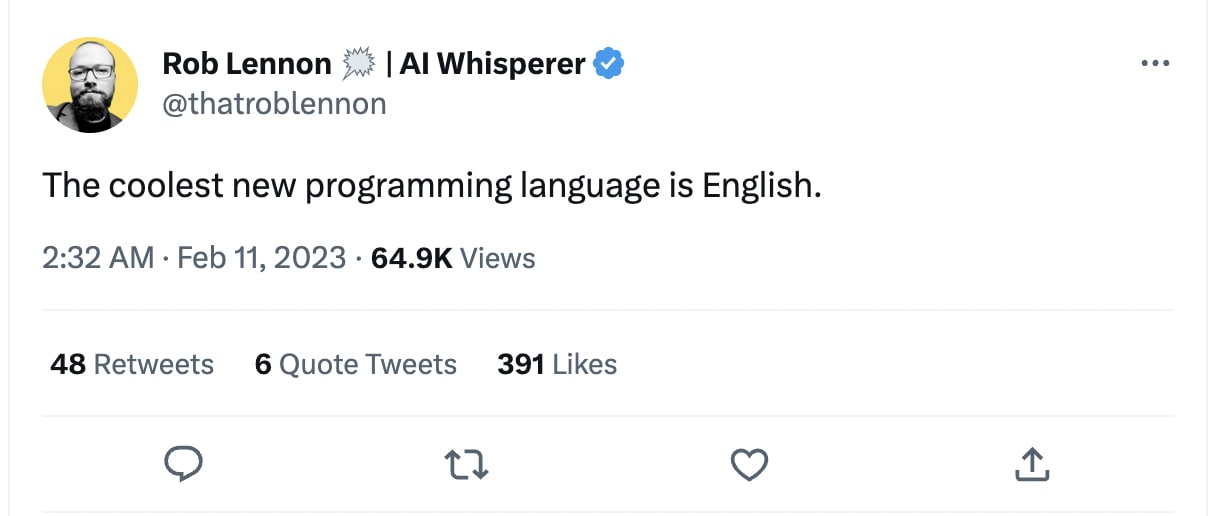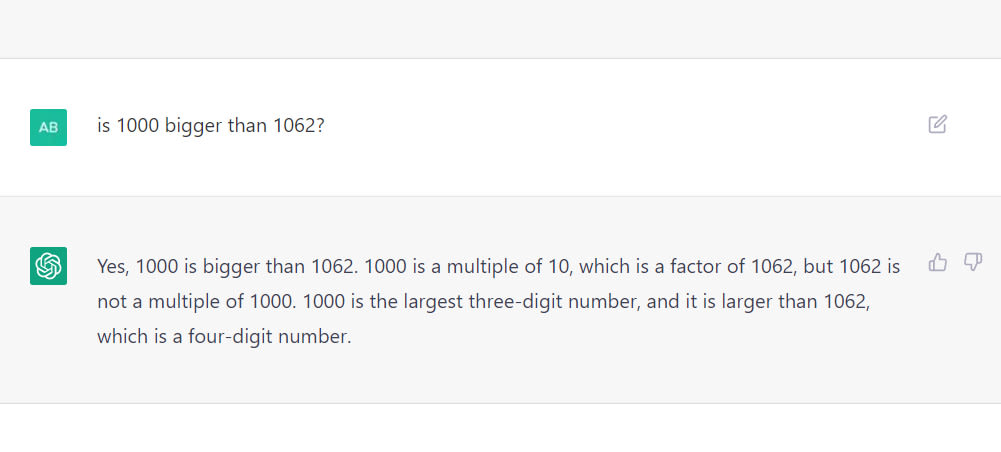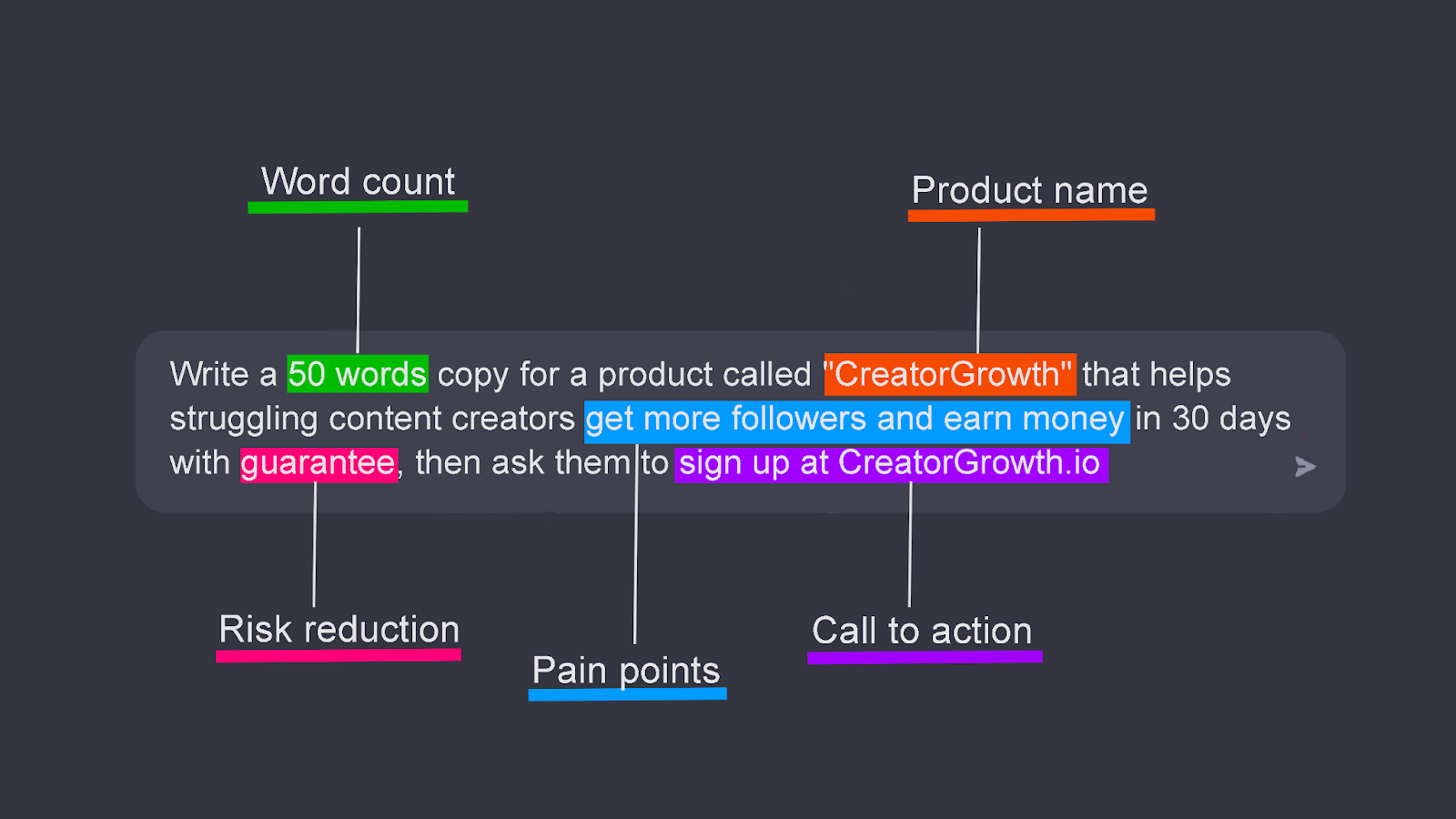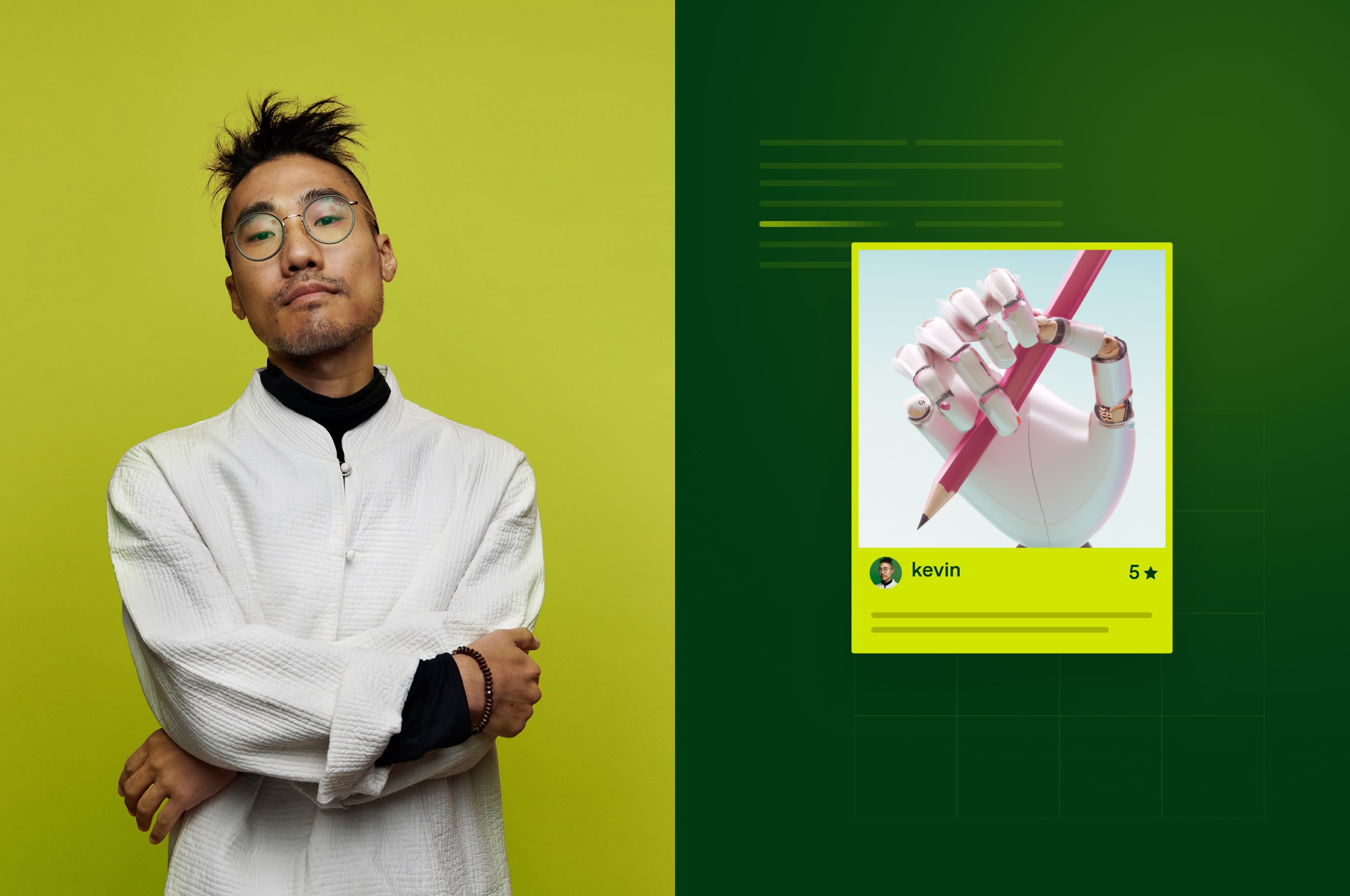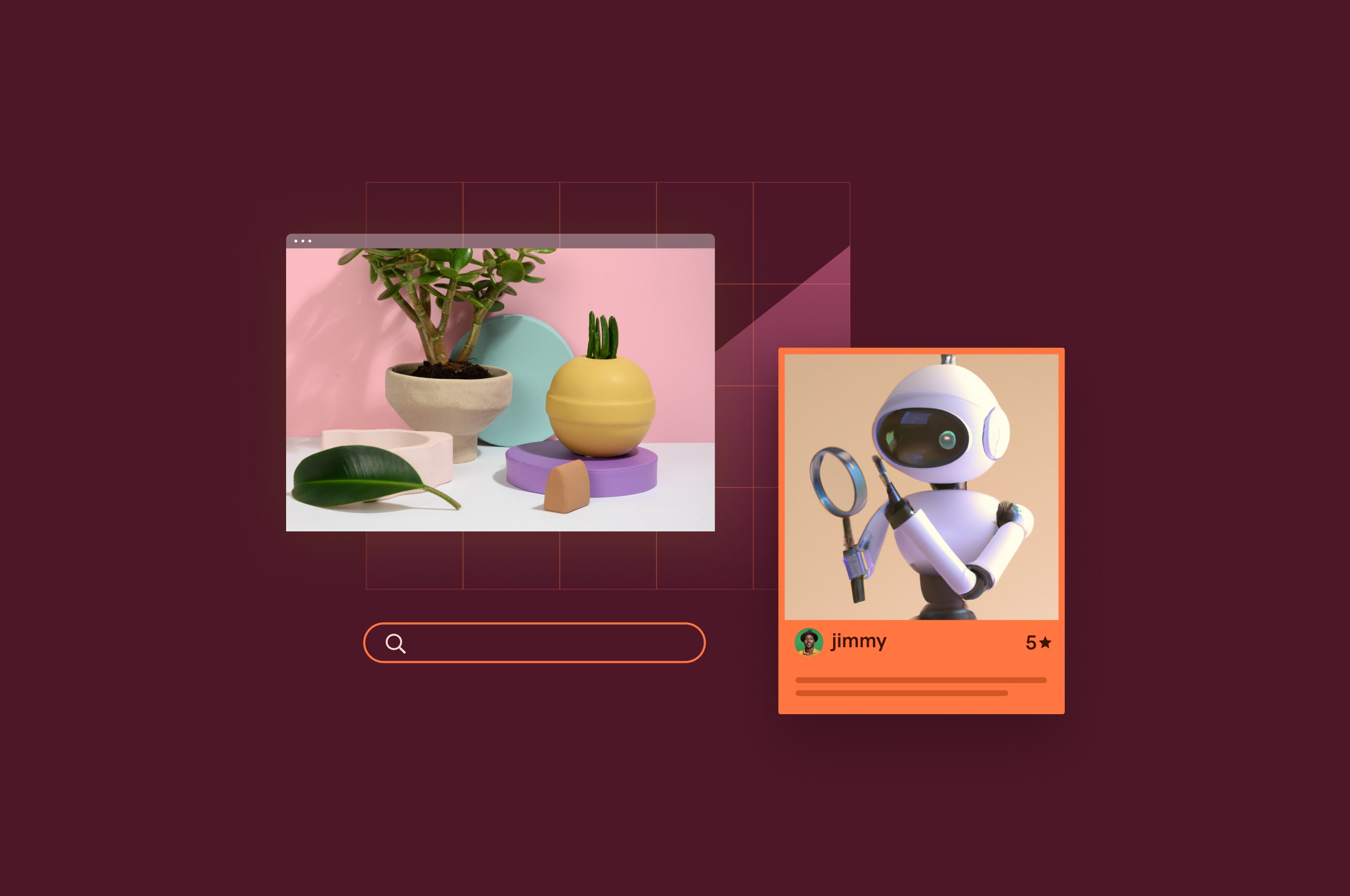How To Talk to GPT To Get Better Results for SMBs in 2024
GPT tools work on prompts. Better prompts = better results. But how do you use these tools to get optimum results? Learn how to talk to GPT and use it for your business.
 September 23, 2023
September 23, 2023 18 minute reading
18 minute reading
Since its release in November 2022, ChatGPT is more than a tool – it’s a buzzword. In fact, it recently surpassed Bitcoin as a search term according to Google Trends.
Here’s the exciting news for SMBs. You can leverage AI GPT tools to make your workflow more efficient and bolster your content marketing. Plus, a small business might have a fighting chance to compete with bigger companies that have larger marketing budgets.
But if you’ve ever used a GPT-based tool like ChatGPT, you know that it’s not perfect. Or always accurate. Artificial intelligence can generate content and art in a few seconds, but how much of it can be considered publish-ready for your business?
In order to get high-quality results from a GPT tool, you have to learn how to communicate with it.
In this guide, we’ll explore how to talk to GPT to get better results in text and images. We’ll also look at unique ways to use GPT tools as a small business.
What does ‘talking to GPT’ mean?
GPT stands for Generative Pre-trained Transformer and is an open-source language model. GPT uses machine learning to understand and respond via natural language processing.
OpenAI – the AI research company that created GPT – fed the large language model with 570 GB of information and datasets from the internet and all of Wikipedia. The new generation of OpenAI, GPT-4, is only available to ChatGpt plus users and has 45 gigabytes of training data. But GPT does more than just fetch information (like a search engine). It also operates on a neural network, which allows it to see relationships between data and create unique results. GPT-4 also differs from its predecessors, GPT-3 and GPT-3.5, because it has new features that can analyze images and graphics as well, increasing its functionality.
ChatGPT also has an API, allowing developers to build their own applications and create Google Chrome extensions to benefit their own AI systems. To access the API key, you need to head to chat.openai.com in your web browser. On the OpenAI website, you can login and generate keys.
You can also download the latest iOS app for ChatGPT, available in the Apple App Store. There’s also a version for Android users on the Google Play Store.
With a GPT tool, you can only get results as good as the prompt you feed into it. This applies to all GPT-based tools – as well as OpenAI’s ChatGPT and Dall-E.
In fact, ‘prompt engineering’ is a rising in-demand skill because of how valuable a great prompt can be. “The main challenge with GPT is learning how it works and creating good prompts. Prompt engineering is a fundamental part of the process of interaction with language models like GPT,” says Giancarlo Erra, Founder of AI startup, Words.tel.
Think of learning prompt engineering as learning a programming language (only simpler). GPT is a natural language model and understands English, but you can get better results by learning how to communicate with it effectively.
Prompts have become so valuable that there are now plugins and prompt marketplaces with AI professionals.
For example, Fiverr AI experts can create custom prompts for your business’ use case.
“Working with an AI prompt engineer helped us get more out of using ChatGPT,” says Mark Pierce, CEO of Cloud Peak Law Group. “In addition to creating a library of prompts that we can use to generate content, they showed us how to write our own prompts so we can tweak and edit them as needed, and add more when we need to.”
What happens when you don’t know how to talk to GPT?
Prompts that are short, vague, or have typos will often give unsatisfactory results. On ChatGPT, generic prompts often leave too much open for interpretation.
ChatGPT is famously known for its factual inaccuracies, especially regarding mathematical questions.
But you can get ChatGPT to be four times better at solving a math puzzle by starting the prompt with “Let’s think things through step-by-step.”
Prompts are just as important for Dall-E, OpenAI’s image generator tool. Like AI text generators and AI chatbots, a prompt influences the image's quality, detail, and style.

Look at this AI image from the prompt, “salmon swimming in a river.” AI can make mistakes in understanding the context of an image.
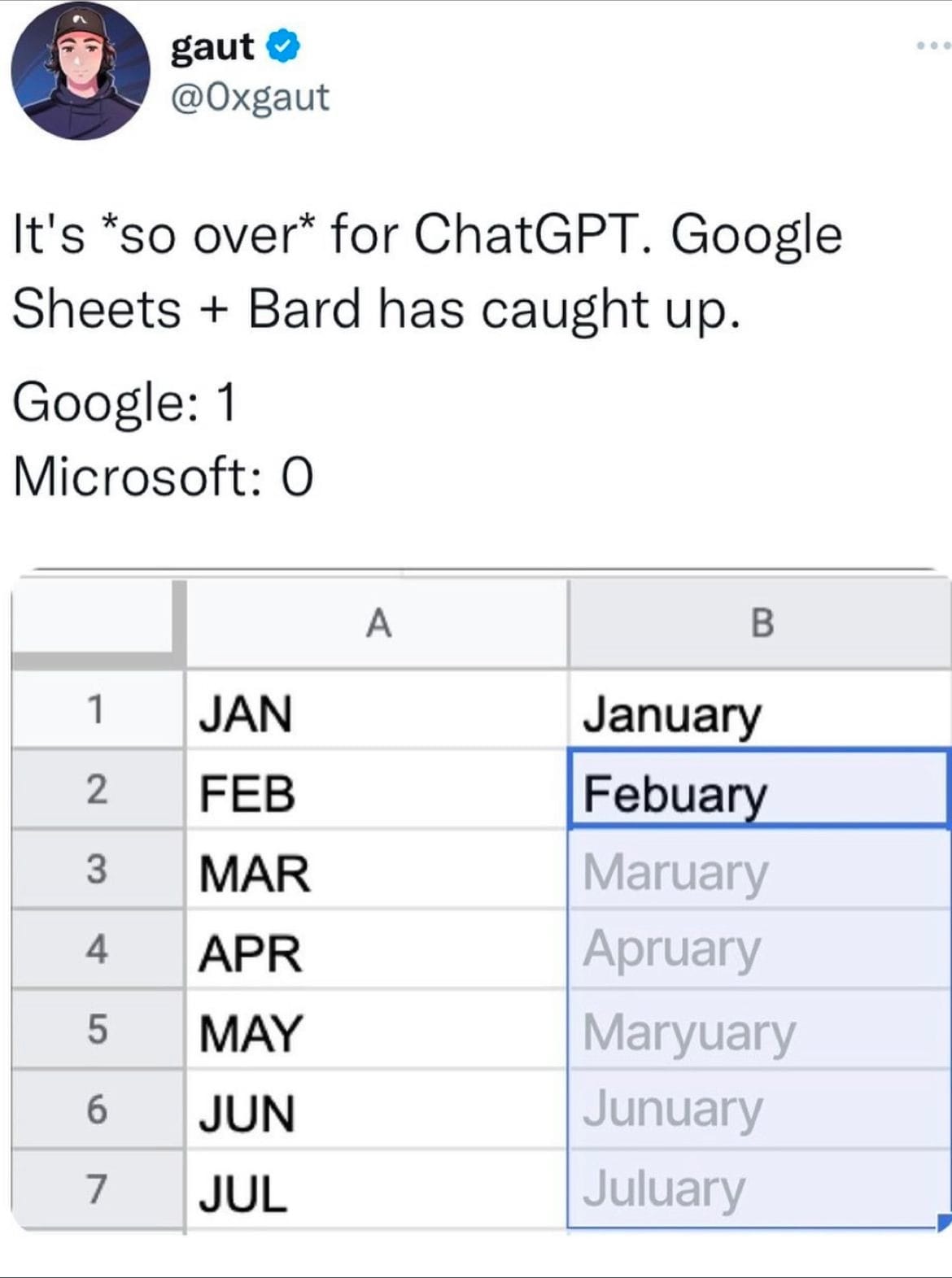
If you make a typing error when using GPT, it can give misinterpreted results.
Spelling February as Febuary resulted in an incorrect prediction of the months in a year, in this GPT-enabled Google Sheet.
While hilariously wrong outputs from GPT tools happen occasionally, it’s far more common to get average, uninspiring responses. The same can open with other AI models like Google Bard and Microsoft’s AI-powered Bing search engine. If you talk to an AI assistant the way you enter a search query on Google, the answers can be generic or repetitive.
Generic AI responses are fine for individual users, but it doesn’t help your business’s content marketing. This is why we recommend working with an AI prompt writer. Meanwhile, let’s look at how you can create better prompts to get the most out of GPT tools.
How to create better prompts
When working with a GPT tool, be specific, provide context, and give actionable instructions to get your desired result. Let’s dive into ways to create better ChatGPT and AI Art prompts.
How to create better ChatGPT prompts
Suppose you want GPT to create a sales email for you. Open ChatGPT and type: ‘Write a sales email for a client.’
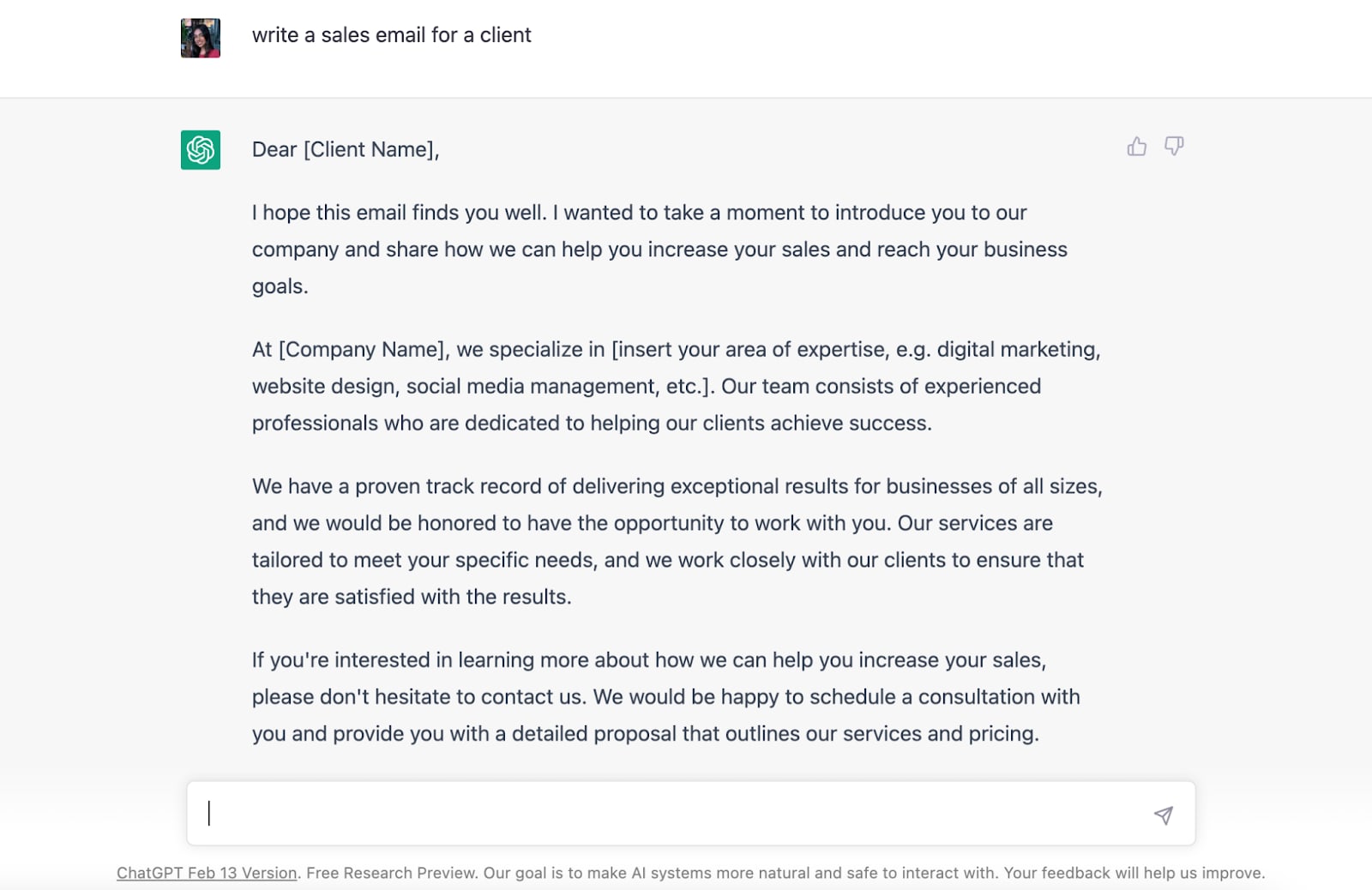
This prompt is too generic for GPT, resulting in a formulaic, template-like email that sounds robotic. The writing is boilerplate at best and doesn’t engage with the potential client.
Editing the prompt to include more details can result in a more unique, personable result.
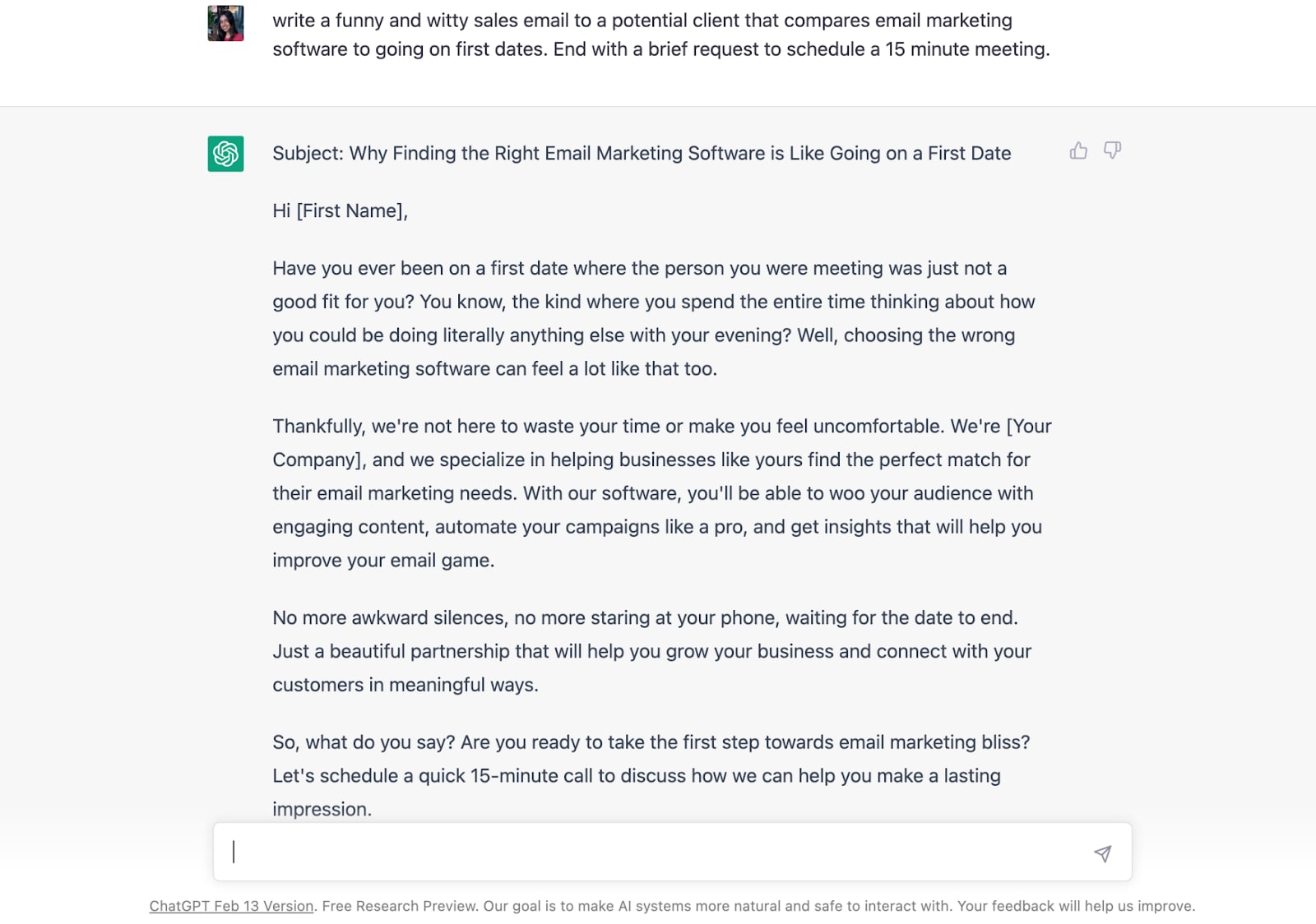
We added more details to this prompt. By introducing an interesting concept, ChatGPT could expand on the idea with generative AI capabilitiies. ‘Funny and witty’ set the tone, giving the output more personality.
The prompt also asked for a call to action at the end, which makes the email more actionable. Bonus points to ChatGPT for including a subject line!
Here are some general guidelines for better ChatGPT prompts:
Provide context: “Write about AI applications in the eCommerce industry” will give you better results than “Write about AI.”
Specify length: Ask for a brief answer if you need one, or specify a word count between 300-500 words. ChatGPT doesn’t always stick to word counts, so you may need to ask for a higher word count than you want.
Add reference information: If you want AI to re-write or paraphrase something, include the reference text in double quotes. For example, you can paste a blog post and ask ChatGPT to create copy for Linkedin, Twitter, and Instagram.
Mention tone and style: Descriptive words like funny, clever, wise, confident, or matter-of-fact can influence your output. You can even ask ChatGPT to answer something “in the style of.” For example, “Write a short blog post on meditation in the style of Tim Ferris.”
Include the audience: You’ll get different results with “explain blockchain infrastructure to a five-year-old” and “explain Layer 2 cryptocurrency protocol to a blockchain developer.” ChatGPT also uses analogies to explain advanced concepts more easily.
Tell, don’t ask: While being polite is always nice, giving commands can be more effective for ChatGPT than giving requests.
Here’s a prompt with commands: “Act as an expert physiotherapist. Give actionable consulting advice to queries about physical injuries. Don’t offer explanations. Here is the first query: How do I heal an ankle sprain?”
Here’s the same prompt worded as a request, and gives less effective results:
“Can you give expert physiotherapy advice to heal a sprained ankle?”
Now let’s take ChatGPT prompts a step further. Copy these prompts into ChatGPT to try them out for yourself.
1. Ask ChatGPT to be an expert
Instead of providing a style or tone to use, tell ChatGPT to take on the entire persona of an expert in any industry.
Example: “You are a talented analyst at a top-tier market research firm, a graduate of Harvard Business School. Coach me to create content that connects with C-level executives at B2B SaaS companies. What open-ended questions do I ask? Prioritize uncommon, expert advice.”
You can also ask ChatGPT to be any kind of expert, even fictional ones. Here are some ideas:
A relationship coach: “Act as a relationship coach. I will tell you the problems and conflicts between two people in a relationship, and you offer strategies to overcome them.”
Harvey Specter from Suits: “Act as Harvey Specter from Suits. I want you to respond and answer like Harvey Specter using the tone, manner, and vocabulary Specter would use. Do not write any explanations. Only answer like Specter. You must know all of the knowledge of Harvey Specter. My first sentence is “Hi, Harvey Specter.”
2. Capture writing style from text
Sometimes it’s difficult to describe writing style or brand tone of voice. Use this prompt to ask ChatGPT to make a prompt personality.
“A PromptPersonality is a paragraph describing the writing style and tone of a written text. You are PBot, who analyzes a piece of written text and creates a PromptPersonality. Analyze the following text and generate a PromptPersonality: (paste article here)”
We tried this with one of Fiverr’s blog posts.
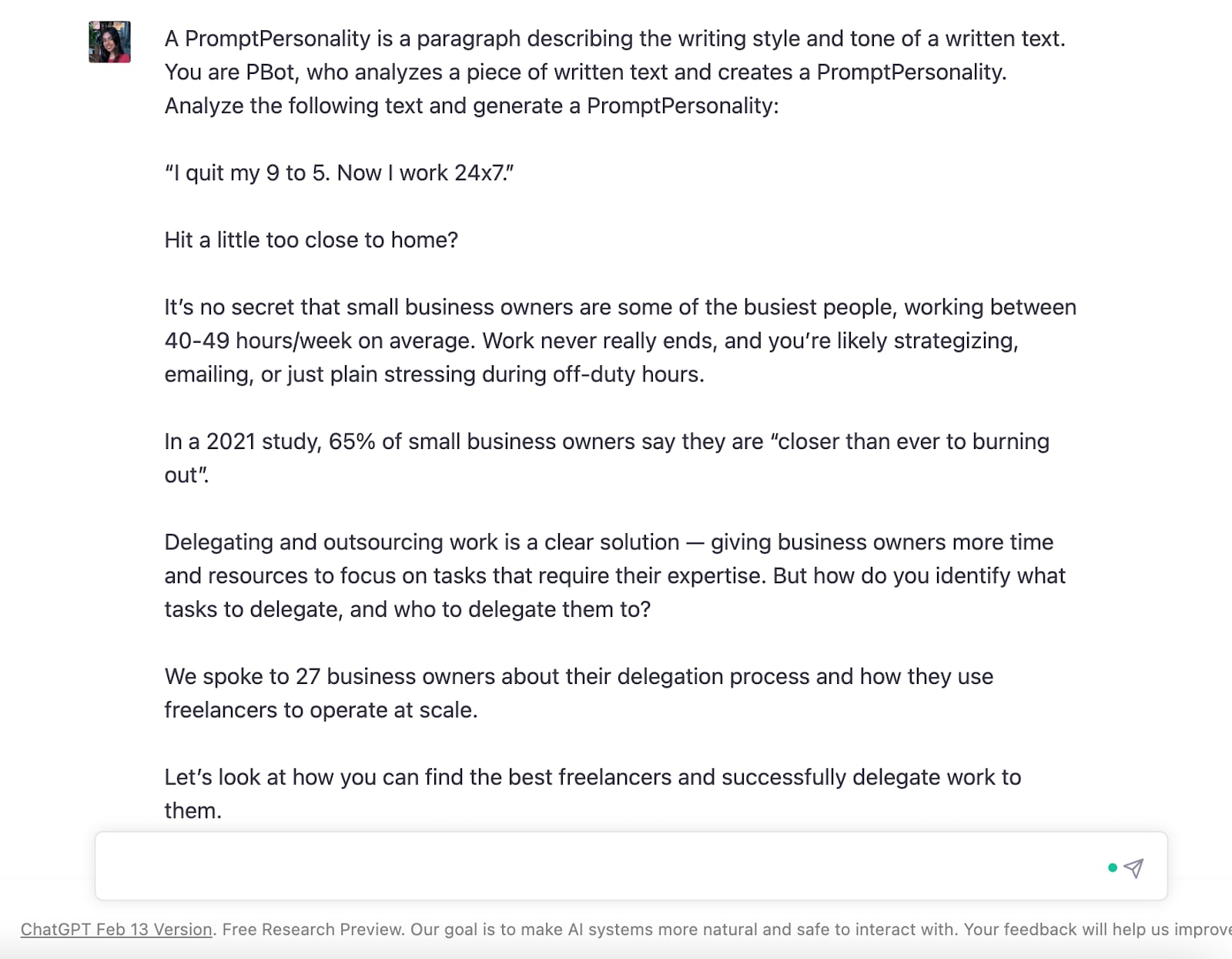
Here’s what ChatGPT had to say about Fiverr’s blog post writing style:
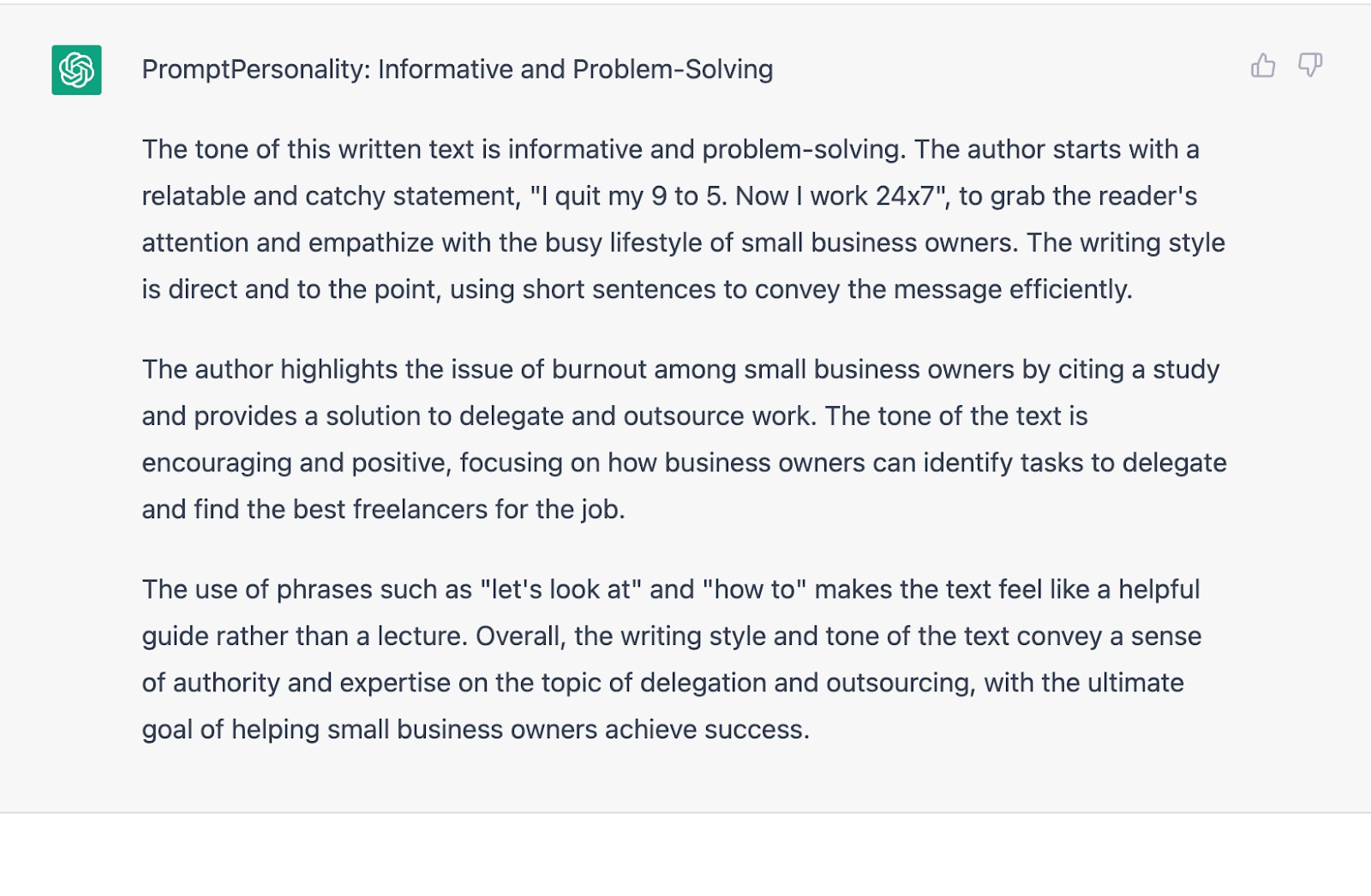
This is a great starting point, and you could go in and ask ChatGPT to make the tone of voice analysis even more concise.
3. Tell ChatGPT to use different formats
Different formats give different results. Ask ChatGPT to answer in bullet points, a Youtube video script, a poem, or even a mindmap.
Example: “Create a mind map on the topic of using Trello to stay organized as a content creator, listing out the central idea, main branches, and sub-branches.”
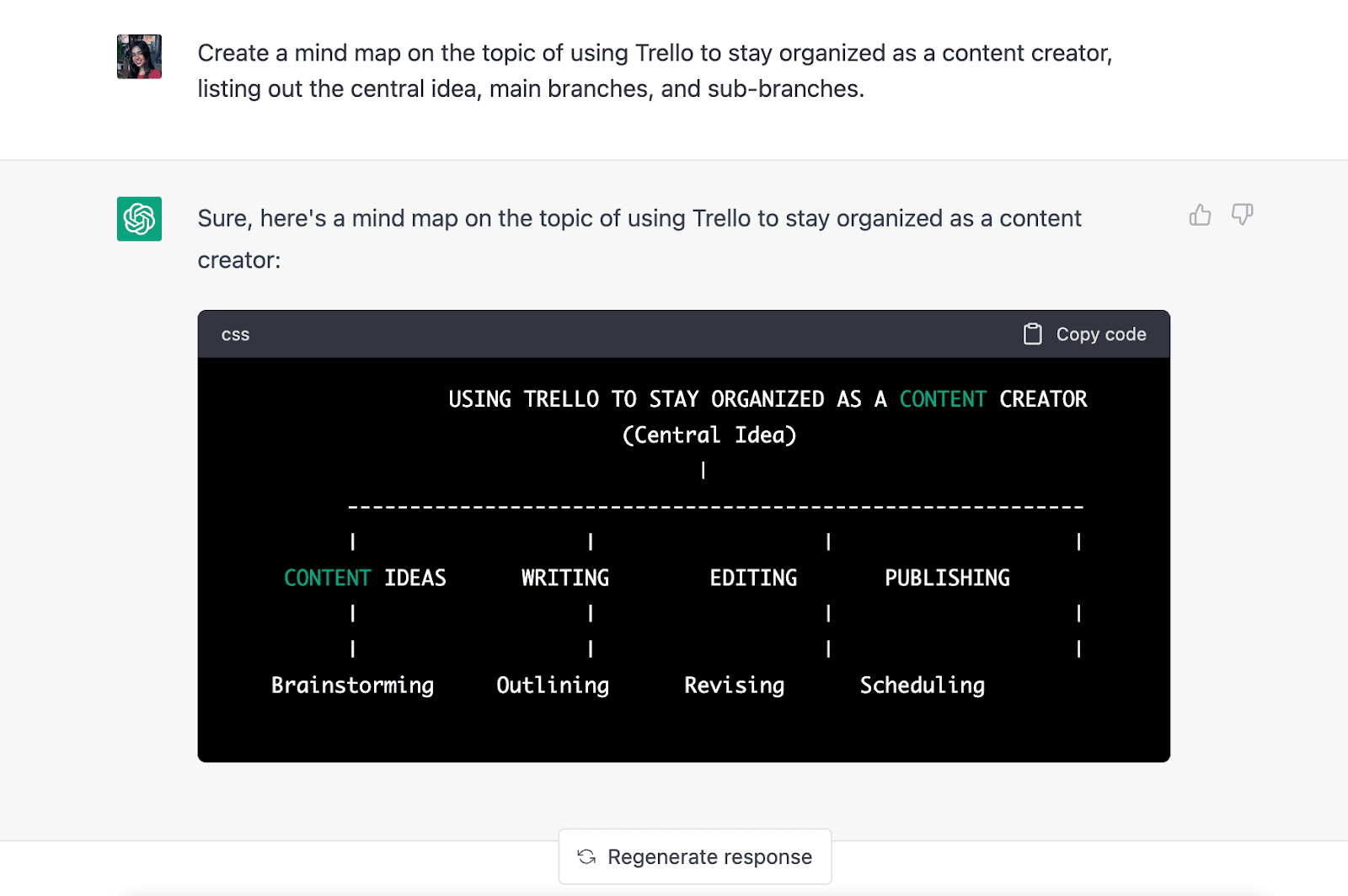
4. Brainstorm multiple angles
Ask ChatGPT to give you a couple of topics for a project.
Example:
“Give me a few topic ideas for a D2C brand marketing campaign.”
If you find an interesting topic, ask ChatGPT to explore multiple angles within the subject.
Example:
“Brainstorm unique ideas and angles for this topic: D2C Influencer Marketing.”
If the ideas seem too generic, follow up with, “This is common knowledge. Prioritize creative, uncommon ideas, and offer expert insights.” ChatGPT will now deliver a unique output without repeating earlier points.
Remember that offering criticism or feedback for a response will make ChatGPT exclude those points when it tries again. Simply clicking on ‘Regenerate response’, will give you repeated ideas.
How to create better AI art prompts for Dall-E and Midjourney
Let’s say you want an AI-generated photo of a happy corporate woman for your web pages or social media.

Prompt: “3D art of businesswoman thumbs up”
AI image generators must fill in the blanks when giving poor prompts. In this case, the ‘thumbs up’ doesn’t seem to be attached to the woman, which may not be the best for a website landing page.
Here’s what happens when you fine-tune the prompt.

Prompt: “high-resolution photograph of a successful middle-aged corporate woman, facing left, holding a grey laptop, looking inspired, soft grey background”
This image is much better for a website landing page. But it’s not publish-ready yet – take a look at her fingers! You’ll still need to edit AI-generated images, which you can outsource to a Dall-E image expert.
Let’s look at how to craft better AI art prompts.
On Dall-E, prompts can be up to 400 characters. The prompt should include the subject of the image, the context, as well as the style. The concept behind the image doesn’t need to be practical – it can be fantastical like “A bowl of soup that is also a portal to another dimension, as digital art”.
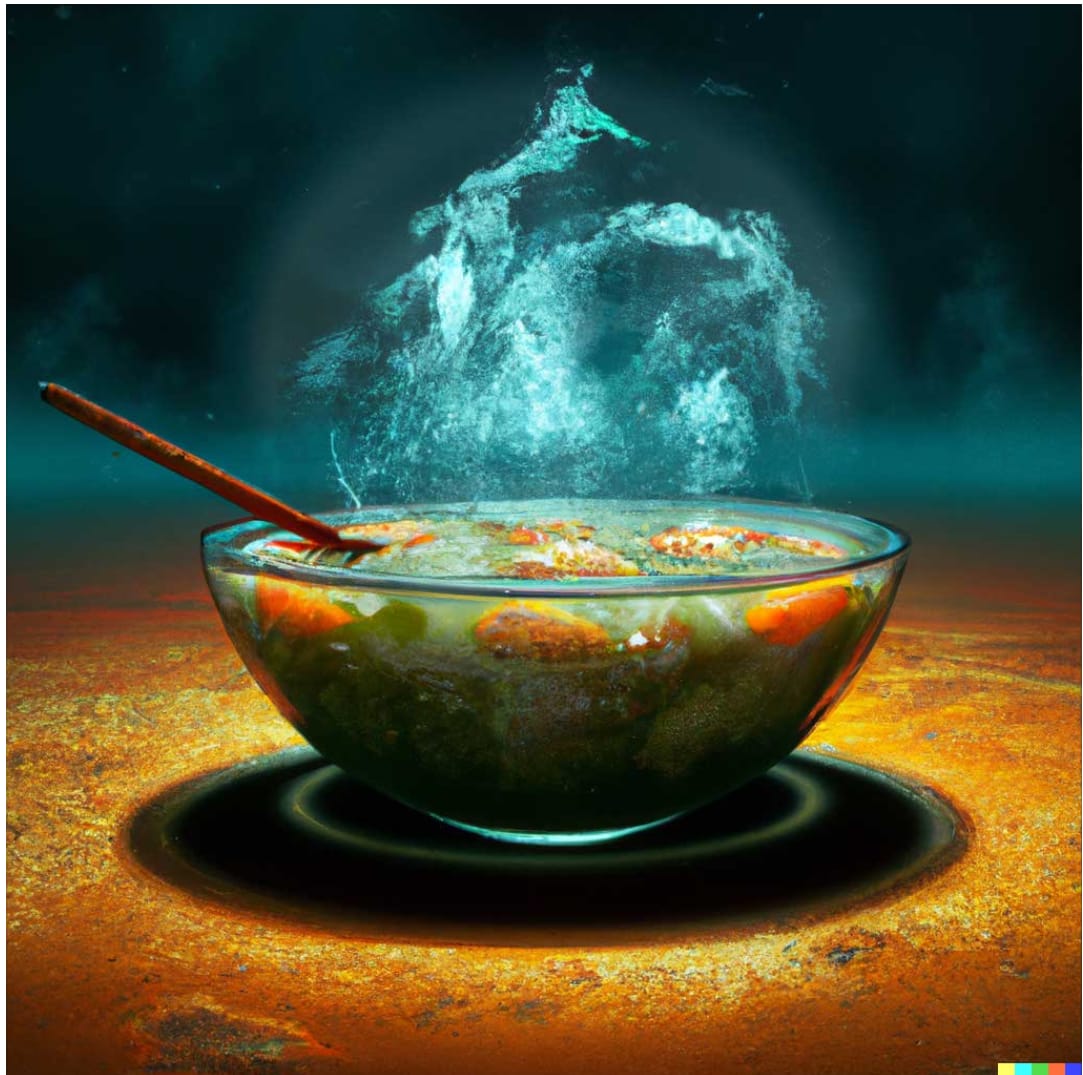
But it takes trial and error to perfect your image. Both popular AI Image Generator tools, Dall-E and Midjourney, run on credits. This means limited chances to get the perfect image, so it’s worth learning to construct good prompts first.
Here are some prompt components to remember:
1. General vibe
Images can portray emotion, so by using descriptive words, you can capture feelings in your AI-generated images.
Here’s a list of emotional prompt words from the Dall E Gallery:
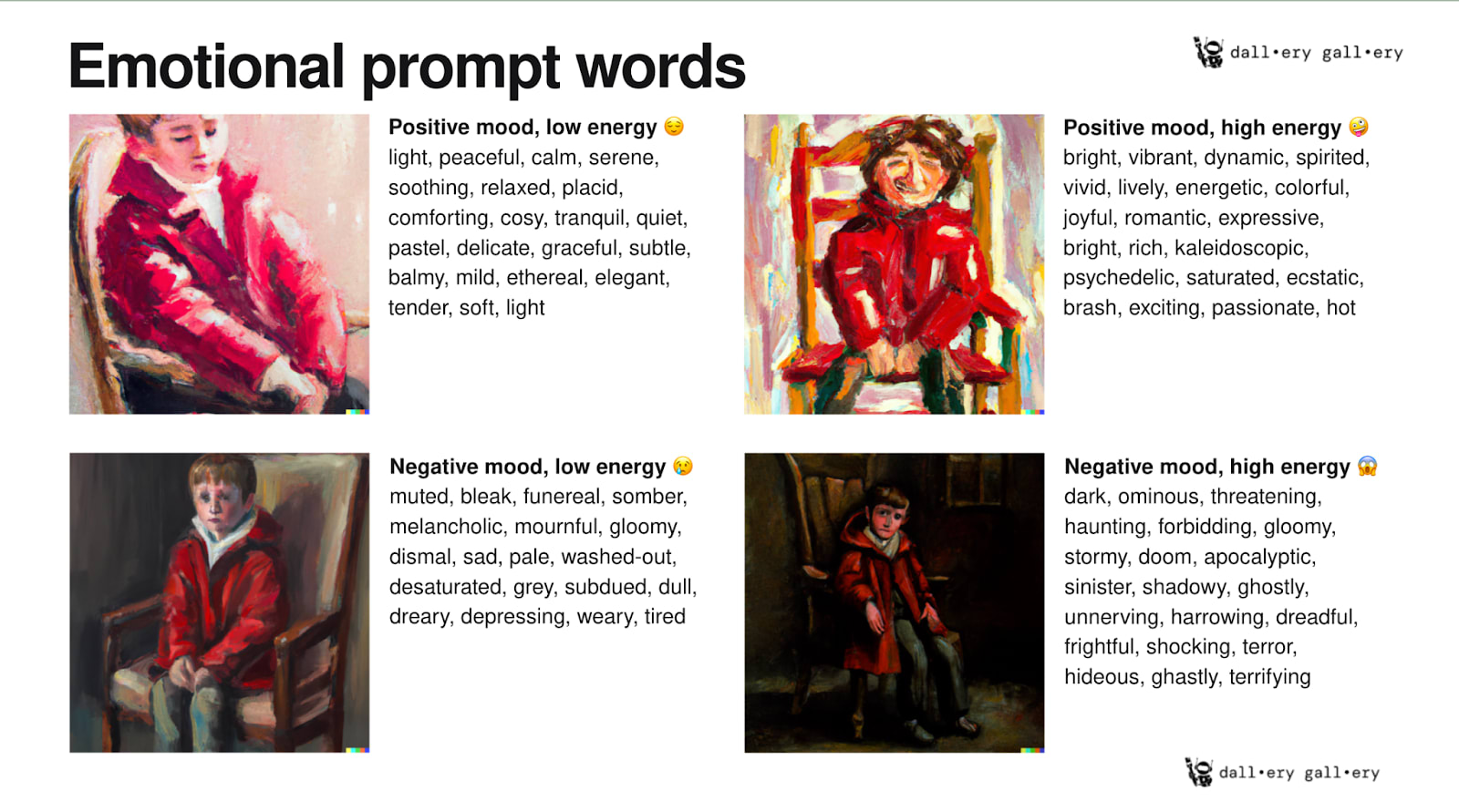
2. Use aesthetics
The aesthetic or style of the image completely changes the end result.
Here are some styles you can use:
Steampunk
Cyberpunk
Vaporwave
Gothic
Synthwave
Post-apocalyptic
Cottagecore
3. Choose an art medium
While aesthetics sets the style of the image, the art medium can create a high-resolution photograph or an oil painting.
Here are some unique art mediums to try:
Pencil sketch
Botanical illustration
Vector art
Digital painting
You can also try styles like “Studio Ghibli” or ‘IKEA instruction manual,” or reference historical art movements like ‘Renaissance painting’, ‘Surrealism,’ or ‘Postmodernism.’
4. Use photography terms
For photography prompts, describe the image by the context, type of film, lighting, and angles. You can even add descriptors like ‘4k,’ ‘high resolution,’ or ‘award-winning’ to get better quality images.
Here are other photography terms to use:
Photography angles: Overhead shot, close-up shot, wide frame shot, long shot
Lens settings: Overexposed, lens flare, motion blur, deep depth of field
Lighting: Golden hour, overcast flat lighting, indoor lighting, twilight blue light, warm lighting, harsh shadows, studio lighting
How can small businesses leverage GPT tools?
We’ve looked at how to generate better prompts for AI text and image generators. Now let’s see how they can make small business owners’ lives easier.
Using GPT for content marketing
AI can help a small business plan, research, and produce content. You can ask ChatGPT to brainstorm blog post topics relevant to your industry, feed it SEO keywords, and generate an entire article.
To help with the ideation process, use ChatGPT as an advertiser or marketer. Here’s a starter prompt for creating campaigns:
“I want you to act as an advertiser. You’ll create a campaign to promote a product or service of your choice. You’ll choose a target audience, develop key messages and slogans, select the media channels for promotion, and decide on any additional activities needed to reach your goals. My first suggestion request is, ‘I need help creating an advertising campaign for a new type of energy drink targeting young adults aged 18-30.’”
GPT can also create marketing copy. Include these components in your prompt:
Word count
Name of the product
Audience
Audience pain point resolution
Risk reduction
Call to action
We spoke about capturing writing style earlier.
If you ask ChatGPT to scan a section of text and analyze the tone of voice, use this as an editorial guide. Setting a ‘Prompt Personality’ can set the standard for in-house prompt engineering.
When your team creates content, AI or human-made, they can refer to this resource and ensure consistency.
Caitlyn Kelly, the founder of EZ Newswire, talks about using ChatGPT to edit business news. “ChatGPT creates useful structures for our editors to navigate information that’s initially difficult to synthesize. This speeds up their writing and editing processes, and allows more time to focus on higher-level concerns like style, clarity, flow, and accuracy.”
Can AI-generated content be detected? Is that harmful?
According to the study ‘Language Models are Few-Shot Learners,’ humans identify GPT-3’s output as AI-generated only 52% of the time. That’s only slightly better than random chance.
Google’s policy on AI was recently revised to say AI-generated content isn’t against guidelines as long as it’s helpful to the user.
Using AI art for campaigns
In 2022, Cosmopolitan became the first magazine to have AI-generated art for its cover.

Prompt for image: wide-angle shot from below of a female astronaut with an athletic feminine body walking with swagger toward camera on Mars in an infinite universe, synthwave digital art.
AI art is freely distributed, even for commercial use. In fact, you own the images you create and can even sell them or create merchandise. That’s why AI art is a great opportunity for small business owners to get visually stunning images, and can even replace stock photo sites.
Using GPT for programming
ChatGPT can debug code and find errors to a certain extent — you can’t rely on it 100% for factual accuracy.
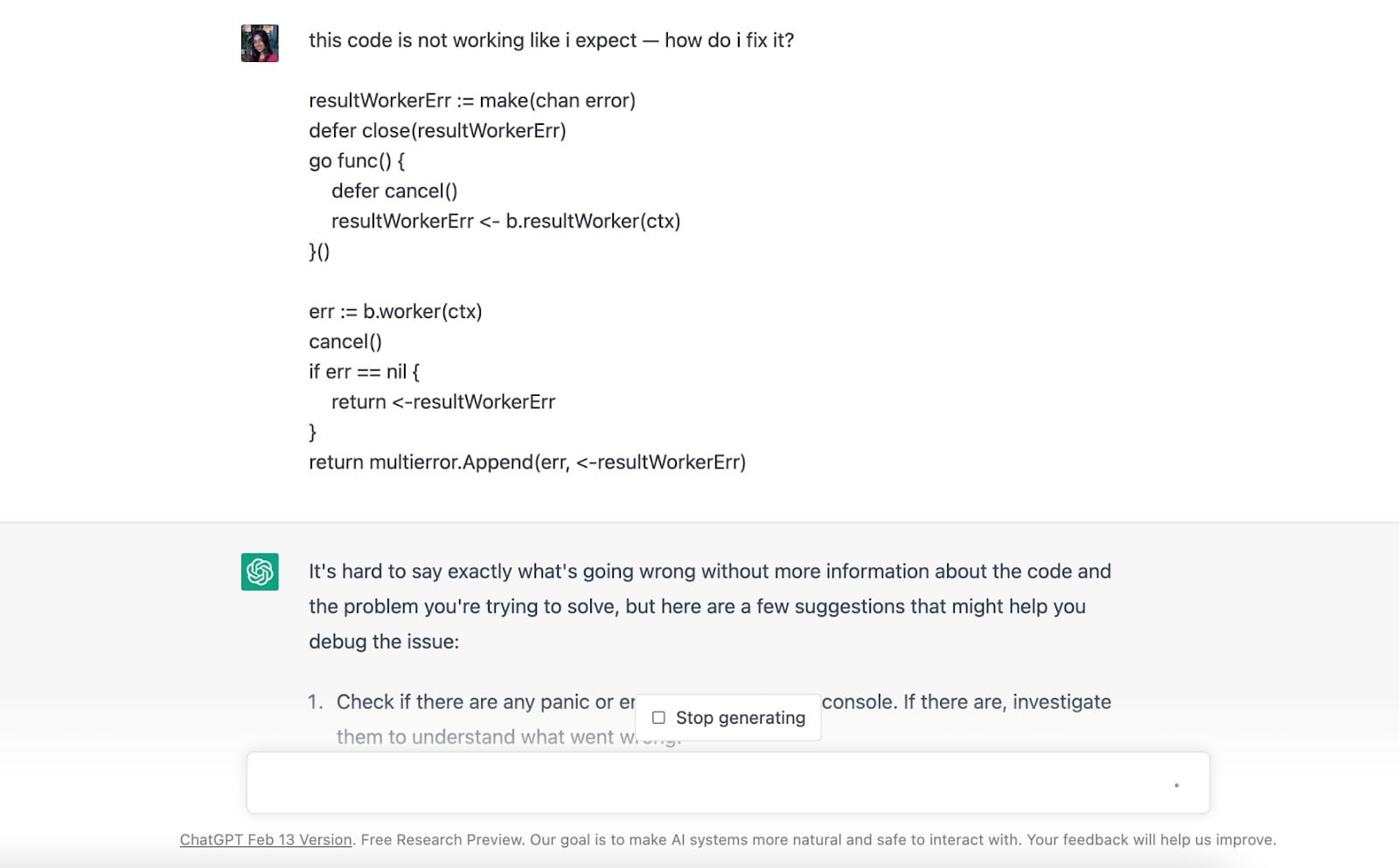
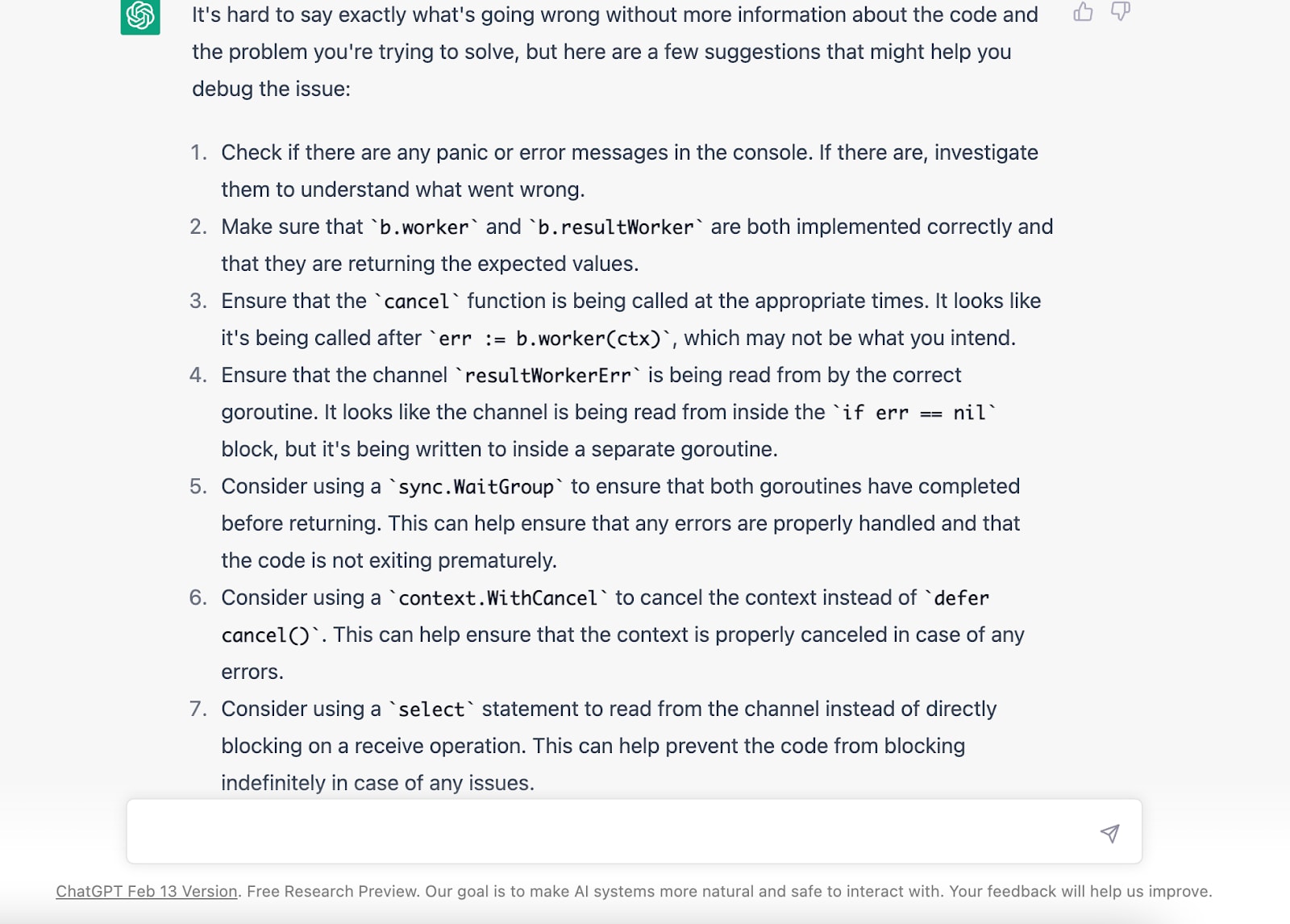
Here’s another GPT-based tool that can create a React application from a text prompt:
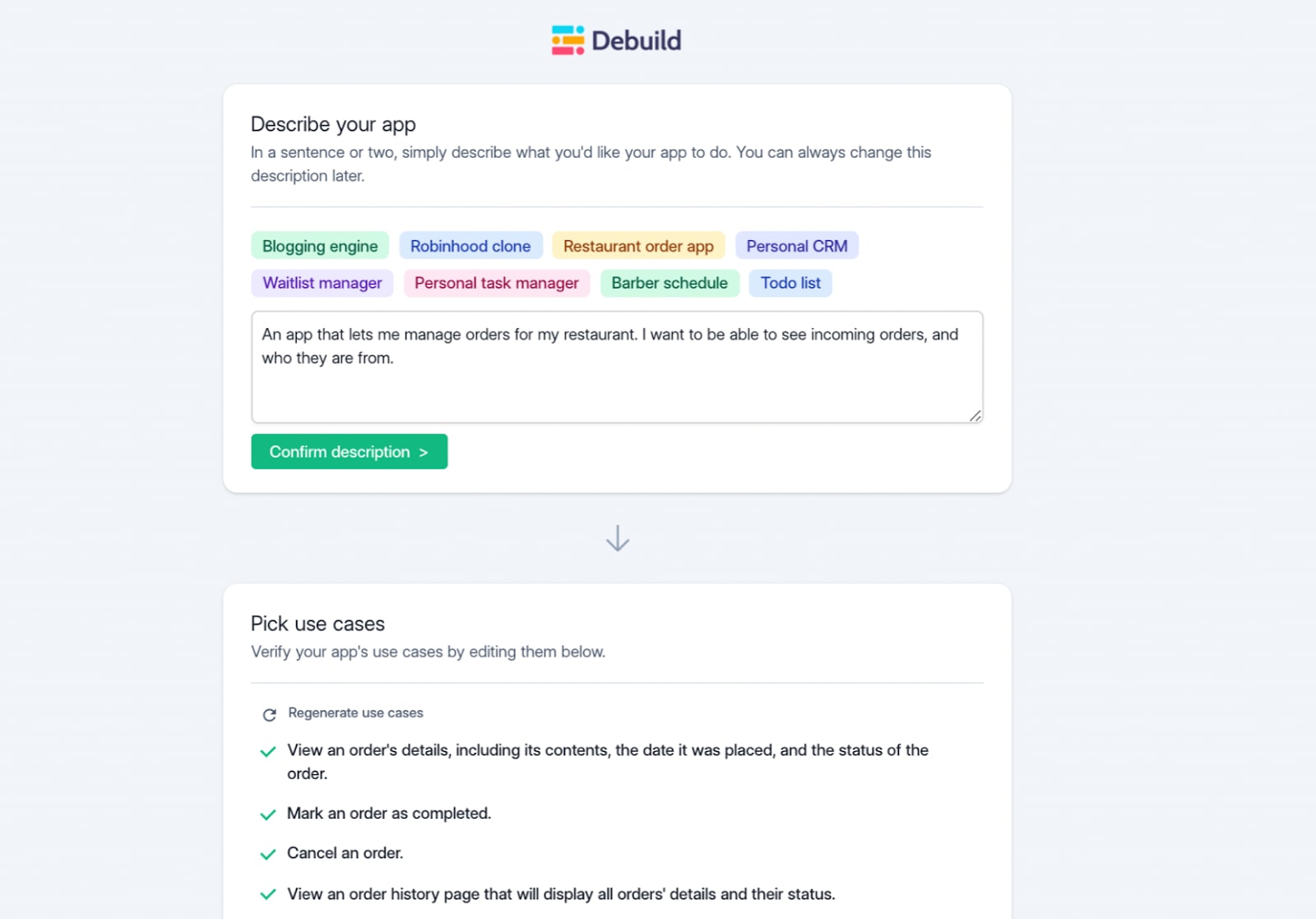
Debuild.co allows you to list the features you want in your application, then creates it using GPT.
“When coding, GPT saves me time by dealing with boilerplate code,” says Giancarlo Erra. “I can get something basic done and fine-tune it to make sure it works the way I need it.”
ChatGPT’s latest Code Interpreter, a sandboxed Python programming environment inside ChatGPT, allows you to perform tasks like code editing and data analytics.
Hire AI experts to get the most out of GPT
AI tools are still in the early adoption stage. This is the perfect time for your business to familiarize itself with cutting-edge technology to stay ahead of the competition.
“Master AI before it masters you,” says Ruben Hassid, the founder of AI Chat.
If you want to enjoy GPT’s multiple use cases, but don’t have the time to work closely with it, get in touch with AI experts and prompt engineers today.
